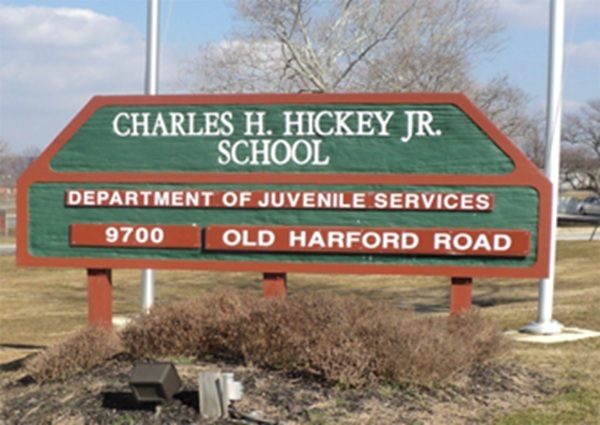PARKVILLE, MD—State Sen. J.B. Jennings visited the Charles H. Hickey Jr. School in Parkville on Tuesday, July 8, to assess safety conditions and address ongoing concerns about staffing and accountability at the juvenile detention facility. The tour comes amid increased scrutiny of the Department of Juvenile Services (DJS) and followed the resignation of the former secretary.
Jennings was joined by newly appointed Acting Secretary Betsy Fox Tolentino, Esq., marking one of her initial official site visits. Guided by a longtime Hickey staff member, the tour provided insight into daily operations, safety measures, and disciplinary procedures. Staff were engaged, and youth were observed in classroom activities.
Senator Jennings pressed for details on behavior management and safety protocols for both staff and youth. He noted a sign informing youth and staff how to confidentially report abuse, neglect, or suicidal thoughts during phone time, which he said addressed a major question regarding reporting unsafe behavior.
Following the tour, Jennings and Tolentino discussed the future of DJS. Jennings expressed “genuine concern,” stating, “We need a fresh start with this change in leadership. My community has been targeted by many youth offenders who aren’t being held accountable. Community members are exhausted and feeling the strain on their finances and sense of wellbeing. We need to know that the days of catch and release are behind us, and find ways to get these kids, and Maryland, back on the right path.”
Jennings questioned whether DJS positions fall under public safety exemptions for the state hiring freeze, or if reclassification would be needed to ensure critical roles are staffed. Acting Secretary Fox Tolentino acknowledged the department’s challenges and committed to reform, indicating she is working to reassign vacant non-exempt positions to allow more frontline detention staff hires within the current budget.
Facility safety protocols were a key focus. Each room houses one youth, with 16 youths per unit, ideally with two staff members. However, staffing shortages often reduce this to one. While surveillance is constant, staff expressed concerns that this oversight level is sometimes insufficient. The standard ratio at Hickey is one staff member per eight youths, but this number often increases in higher-need situations, straining staff and leading to youth frustration. Tolentino called the current model unsustainable and pledged to address it through additional hiring and infrastructure updates.
Incident protocols include behavior assessments, individualized safety plans, and increased staffing in affected areas, with leadership notifying parents, case managers, and administrators. Programs are in place to enhance youth leadership skills and build rapport between staff and residents.
Addressing repeated criminal activity by juveniles, Jennings stated, “If you’re released immediately after a car theft, what will stop you from immediately returning to that behavior?”
Acting Secretary Fox Tolentino outlined recent policy changes aimed at enhancing accountability:
- A directive mandates that any youth rearrested while wearing an electronic monitor be held in detention until their next court appearance.
- The same directive orders immediate deployment of a service provider to address behavioral concerns, emphasizing coping strategies and life skills for youth.
- Community detention officers will now be required to attend court hearings of the youth they supervise, providing judges with more context and reinforcing community investment.
- Expanded coaching and training for community detention officers.
- Rollout of a modern data system for real-time analysis, reducing administrative burden and allowing staff more focus on youth and facility safety.
“There’s a long road ahead, but I appreciate the Acting Secretary’s willingness to confront these problems directly and her offer of an open line of communication moving forward,” Jennings said. “The directive released last week marks a major shift from the former leadership’s approach to juvenile crime. We owe it to our youth, our communities, and our correctional staff to get this right. The end to the catch and release repeat offenses will greatly improve our communities and the outlook for these offenders- they can learn that this behavior will not be tolerated and start making changes.”
Photo via DJS


